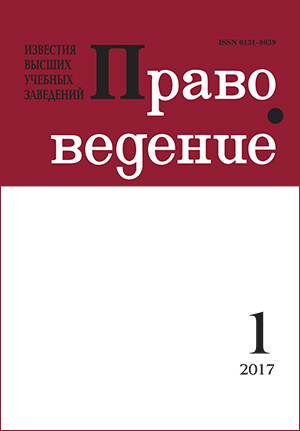Law, exception, crisis: dialectics of the interconnections
Abstract
The article examines the dialectical correlations of law and different exceptional situations, of a legal order and social crises. The author distinguishes between two aspects of normalization as a modus operandi of law: on the one hand, the law depends on a regularity of social relations and, on the other hand, it designates limits of agents’ behavior and establishes the consequences for violation of such limits. The author comes to the conclusion that the law is inseparably connected with a normal, expected social situation at the same time being a tool of responding to certain negative and anti-social phenomena which fall out of the normal process of everyday life (for example, a conflict which seems to be something negative from the sociological point of view, is an ordinary situation from the legal viewpoint). Having analyzed exceptions in the law, the author asserts that the exception is subjected to the rule and is included in the normativity field to a certain extent. Developing this idea, the author distinguishes between the exceptions that may be overcome by ordinary means of a legal system (such as a legal responsibility mechanism, state coercion, analogia legis and analogia juris, subsidiary law enforcement) and the exceptions as situations which are either not stipulated by the existing legal norms and institutions or go beyond the capacities of the ordinary legal means. Characterizing the latter as crisis situations in the law, the author describes them as actual states which may cause considerable risks of deformation or destruction of the existing legal order, social relations, violation of its logics and structure, as well as system interrelations between its constituent elements.
Keywords:
norm, normativity, rule, legal system, legal order, regularity, emergency situation, functions of law
Downloads
References
Downloads
Published
How to Cite
Issue
Section
License
Articles of "Pravovedenie" are open access distributed under the terms of the License Agreement with Saint Petersburg State University, which permits to the authors unrestricted distribution and self-archiving free of charge.




